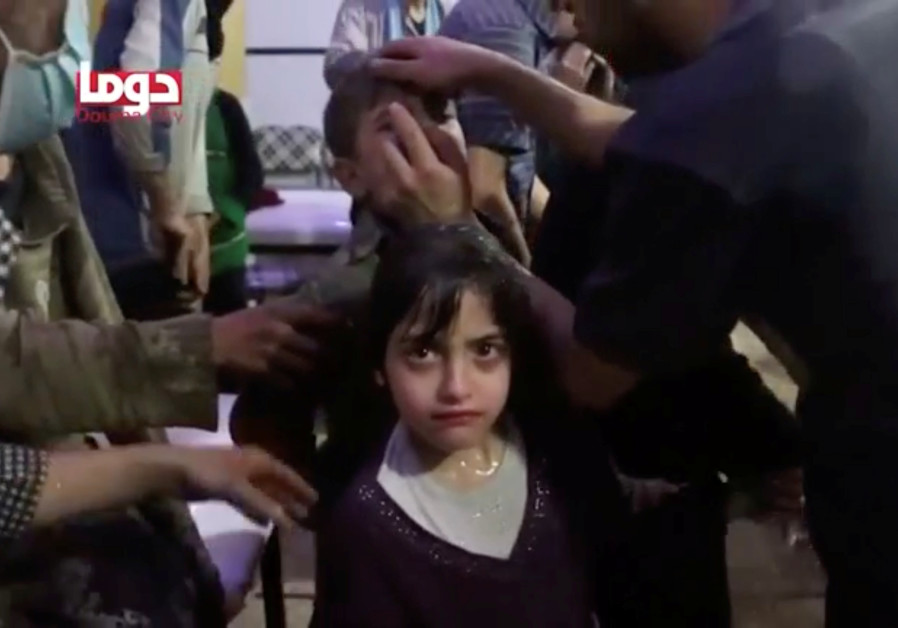Senior Syrian scientist killed in car bomb

A girl looks on following alleged chemical weapons attack, in what is said to be Douma, Syria in this still image from video obtained by Reuters on April 8, 2018. (photo credit: WHITE HELMETS/REUTERS TV VIA REUTERS)
A senior Syrian scientist was killed in a car bomb in the city of Masyaf in Hama province early Sunday morning, local Syrian media reported.
Dr. Aziz Asbar, one of the directors of the Syrian Scientific Studies and Research Center, was killed along with his personal driver as they left his home. Syrian officials have yet to comment on his death.
Asbar was believed to be involved in the manufacturing of chemical weapons as well as the development of medium and long range missiles such as Iran’s Fateh missile program.
He was the second most senior scientist at the Center, under research center director Dr. Amr Armanazi, and was reported to have close connections to Iranian and Korean scientists.
According to Hezbollah’s al-Manar news site, Asbar headed Department 4 at the center, which focuses on the development of all of Syria’s ballistic missile and rocket programs. The department is also in charge of Institute 4000, which houses several chemical weapons programs.
Syria agreed to dismantle its large chemical weapons stockpiles in a Russian brokered deal following the August 2013 sarin gas attack in the rebel-held Ghouta area outside Damascus which saw an estimated 1,400 people die, including 400 children.
Deadly gas attack reported on Syrian rebel enclave, Damascus denies, April 8, 2018 (Reuters)
Over 1,290 metric tons of chemical weapons including sarin, VX and sulfur mustard (precursor to mustard gas) was removed from Syria by the international community.
(function(w,d,s,i){w.ldAdInit=w.ldAdInit||[];w.ldAdInit.push({slot:10834723912266086,size:[0, 0],id:”ld-9628-9059″});if(!d.getElementById(i)){var j=d.createElement(s),p=d.getElementsByTagName(s)[0];j.async=true;j.src=”//cdn2.lockerdomecdn.com/_js/ajs.js”;j.id=i;p.parentNode.insertBefore(j,p);}})(window,document,”script”,”ld-ajs”);
But Syria has since been accused of repeatedly using chemical weapons in the seven-year civil war, including in April in the town of Douma which killed close to 100 civilians and on Khan Sheikhoun in April 2017 that killed 100 others.
In late July, the United States and France imposed new sanctions on eight individuals and five entities affiliated with Syria’s chemical weapons program.
“Syria’s horrific use of chemical weapons, including attacks against innocent women and children, remains deeply embedded in our minds,” Sigal Mandelker, the Undersecretary of Treasury for Terrorism and Financial Intelligence, was quoted by CNN as saying in a statement. “Today, we are continuing our campaign to stop the Assad regime’s ruthless attacks by targeting the procurement networks that have supported its chemical weapons program.”
According to CNN the sanctions will affect “key components of a vast network procuring electronics on behalf of Syria’s Scientific Studies and Research Center (SSRC), the agency responsible for the development of Syria’s chemical weapons.”
Israeli officials have raised their concerns in the past about the transfer of advanced weaponry to Hezbollah and is reported to have struck the Syrian Scientific Studies and Research Center several times, most recently on July 22nd when Arab media reported that Israeli jets hit the one of the center’s arms production sites.
Israel is also believed to have struck the presumed base of the Syrian Army’s secretive Unit 450, a branch of the Center which works on the Assad regime’s chemical weapons program. Western intelligence agencies and Syrian opposition figures alleged that Unit 450 had been dispersing chemical weapons stockpiles around the country as well as to Hezbollah.






Comments are closed.